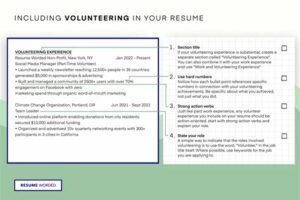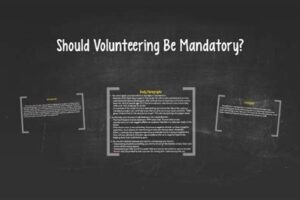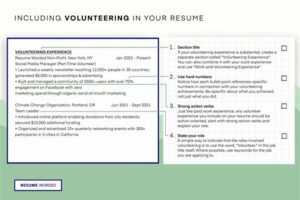Table of Contents
Learn how to write a compelling letter of recommendation for volunteer work with our step-by-step guide. Discover key tips on highlighting the volunteer’s skills, experiences, and dedication. Craft a powerful letter that can make a positive impact and help them stand out.
When it comes to writing a letter of recommendation for volunteer work, it is crucial to provide a strong endorsement that highlights the candidate’s skills, dedication, and impact on the community. In today’s competitive job market, showcasing a potential employee’s volunteer experience can set them apart from other applicants and demonstrate their commitment to making a positive difference. Whether you are an employer, colleague, or supervisor, taking the time to craft a well-written recommendation letter can greatly enhance the candidate’s chances of success. Therefore, it is essential to understand the key elements and best practices in order to create a compelling and persuasive letter that captures the attention of the reader.
Introduction
Writing a letter of recommendation for volunteer work is a valuable way to support individuals who have dedicated their time and efforts to helping others. Whether you are an employer, teacher, or community leader, providing a strong recommendation can make a significant impact on the recipient’s future opportunities. This article will guide you through the process of writing an effective letter of recommendation for volunteer work.
Express Your Relationship
Begin the letter by clearly stating your relationship with the volunteer. Specify how long you have known them and in what capacity. This information helps establish your credibility and provides context for your recommendation.
Highlight the Volunteer’s Commitment
Next, focus on the volunteer’s dedication and commitment to their role. Discuss the specific volunteer work they have been involved in and any notable achievements or contributions they have made. Use concrete examples to illustrate their impact and explain why their efforts have been valuable.
Discuss Skills and Qualities
Highlight the skills and qualities the volunteer possesses that make them well-suited for the position they are applying to. This could include leadership abilities, teamwork, communication skills, organization, or any other relevant attributes. Provide specific examples of how the volunteer has demonstrated these skills during their time volunteering.
Address Reliability and Trustworthiness
Emphasize the volunteer’s reliability and trustworthiness. Mention their punctuality, consistency, and ability to follow through on commitments. Discuss any instances where the volunteer has shown responsibility and reliability, as these qualities are highly valued in volunteer work.
Share Personal Observations
Include any personal observations of the volunteer’s character, work ethic, or passion for their cause. Sharing your firsthand experiences and impressions can add a unique perspective to the letter and further validate the volunteer’s suitability for future opportunities.
Discuss Interpersonal Skills
Describe the volunteer’s ability to work with others and communicate effectively. Discuss their interactions with fellow volunteers, staff members, or the population they served. Touch upon their adaptability, empathy, and ability to build relationships.
Highlight Growth and Development
If you have witnessed the volunteer’s growth and development over time, mention it in the letter. Talk about how they have improved their skills, gained confidence, or taken on more responsibilities during their volunteering experience. This demonstrates their willingness to learn and grow.
Offer a Balanced Perspective
While it is important to highlight the volunteer’s strengths, it is equally important to provide a balanced perspective. If there are areas where the volunteer could improve, address them tactfully and suggest ways they can work on those aspects. This shows that you have an objective viewpoint and helps the reader get a comprehensive understanding of the volunteer’s abilities.
Conclude with an Overall Recommendation
In the final paragraph, summarize your recommendation and offer your overall endorsement of the volunteer. State your confidence in their abilities and express your belief that they would be an asset to any organization or program. Provide your contact information in case the reader has any further questions.
Conclusion
Writing a letter of recommendation for volunteer work requires careful thought and consideration. By following these guidelines, you can create a compelling letter that highlights the volunteer’s strengths, skills, and commitment. Your support can make a significant difference in their future endeavors and help them secure valuable opportunities to continue making a positive impact.
Introduction: Addressing the Purpose and Context
When writing a letter of recommendation for volunteer work, it is crucial to clearly specify the purpose of the letter and provide necessary context. This includes mentioning the name of the organization or program where the volunteer work took place, as well as the duration and nature of the individual’s involvement. Introduce yourself and your relationship to the volunteer to establish credibility.
Highlighting the Volunteer’s Dedication and Commitment
In this section, emphasize the volunteer’s reliability, punctuality, and their willingness to go above and beyond the call of duty. Provide specific examples of how they consistently demonstrated their dedication to the cause and showcase their strong moral character and work ethic. For instance, you could mention their regular attendance at volunteer events, their willingness to take on additional responsibilities, and their positive attitude even in challenging situations.
Outlining the Volunteer’s Relevant Skills and Qualities
When writing a letter of recommendation, it is pivotal to outline the volunteer’s relevant skills and qualities that were instrumental in their successful contribution. These can include communication skills, teamwork, problem-solving abilities, adaptability, and their ability to work independently. Support your claims by including specific instances where these skills were put into action. For instance, you could mention their effective communication with team members, their ability to collaborate with diverse groups of people, and their resourcefulness in finding solutions to problems.
Addressing the Volunteer’s Impact on the Organization or Program
This section should highlight the volunteer’s impact on the organization or program. Explain how their efforts positively influenced the team dynamics, contributed to the overall success of the project, or helped achieve specific goals. Discuss any unique initiatives the volunteer undertook, their ability to inspire others, and how their presence significantly enhanced the volunteer experience. For example, you could mention how their leadership skills improved the efficiency of team meetings, how their fundraising efforts exceeded expectations, or how their positive attitude boosted morale within the organization.
Describing the Volunteer’s Personal Growth and Development
In this section, focus on the personal growth and development the volunteer experienced during their time in the program. Discuss any new skills they acquired, challenges they overcame, or areas where they demonstrated significant improvement. Show how the volunteer’s dedication to self-improvement positively impacted their contribution to the organization. For instance, you could mention how they took initiative to attend relevant workshops or training sessions, how they embraced feedback and made tangible improvements, or how they actively sought out opportunities to learn and grow.
Illustrating the Volunteer’s Interpersonal and Communication Skills
Detail the volunteer’s ability to effectively communicate and collaborate with others. Discuss their capacity to build and maintain positive relationships, resolve conflicts, and work cooperatively towards a common goal. Provide examples of instances where the volunteer’s interpersonal skills were particularly valuable and how they positively impacted team dynamics. For example, you could mention how they facilitated effective communication among team members, how they mediated conflicts between volunteers, or how they consistently demonstrated empathy and respect towards others.
Providing a Balanced Assessment of the Volunteer’s Performance
While it is important to emphasize the strengths of the volunteer, providing a balanced assessment of their performance is equally necessary. Mention areas where they may have faced challenges or had room for improvement, but always conclude the assessment on a positive note, highlighting their potential for growth and ability to learn from constructive feedback. For instance, you could mention a specific instance where they struggled initially but ultimately showed perseverance and improvement, or how they actively sought feedback and implemented suggestions to enhance their performance.
Ending on a Strong and Reiterating Recommendation
In the conclusion, summarize your positive recommendation for the volunteer. Reinforce their suitability for future volunteer opportunities or employment, highlighting their exceptional qualities and the overall value they bring to any organization. Express your willingness to provide any additional information and provide your contact details for further correspondence. For example, you could state that you wholeheartedly recommend the volunteer for any future endeavors, highlight their outstanding dedication and skills, and offer to discuss their qualifications further if needed.
Writing a letter of recommendation for volunteer work is an important task that requires a professional tone and voice. Such a letter serves as a testament to an individual’s dedication, skills, and contributions to a specific cause or organization. To effectively write this letter, it is crucial to follow a structured approach and include specific details about the volunteer’s experiences. Here are some key points to consider:
- Introduction: Begin the letter with a formal salutation and introduce yourself as the person writing the recommendation. Clearly state your professional relationship with the volunteer and how long you have known them.
- Context: Provide a brief overview of the volunteer work the individual has been involved in. Mention the organization, project, or cause they have dedicated their time to. Explain why this cause is important and the impact it has on the community.
- Skills and qualities: Highlight the volunteer’s specific skills, qualities, and personal attributes that make them well-suited for the work they have done. Use concrete examples to support your claims. You can mention their ability to work well in teams, leadership qualities, communication skills, adaptability, or any other relevant strengths.
- Contributions: Discuss the specific contributions the volunteer has made during their time with the organization. This could include the number of hours they have dedicated, the tasks they have performed, and any significant achievements or milestones they have reached. Emphasize any unique initiatives they have taken or projects they have led.
- Reliability and commitment: Highlight the volunteer’s reliability, punctuality, and commitment to their responsibilities. Discuss their willingness to go above and beyond what is expected and their ability to meet deadlines. These qualities demonstrate their dedication to the cause and their ability to be trusted.
- Character: Comment on the volunteer’s personal character and integrity. Discuss their ethical behavior, honesty, and willingness to learn and grow. This demonstrates that they are not only a valuable asset to the organization but also someone who can be trusted and respected.
- Conclusion: Summarize your recommendation and reiterate your belief in the volunteer’s abilities and contributions. Offer to provide further information if needed and include your contact details for reference purposes.
Remember to keep the letter concise, professional, and positive throughout. Avoid using vague language and be specific in your examples and descriptions. By following these guidelines, you can effectively write a compelling letter of recommendation for volunteer work that will help the individual stand out and showcase their dedication and skills.
Thank you for visiting our blog and taking the time to read our guide on how to write a letter of recommendation for volunteer work. As professionals in the field, we understand the importance of volunteers and the significant impact they can have on organizations and communities. Writing a strong letter of recommendation is one way to show your support and appreciation for these dedicated individuals.
First and foremost, when writing a letter of recommendation for volunteer work, it is crucial to highlight the volunteer’s specific contributions and achievements. Use specific examples to illustrate their dedication, commitment, and skills. This will not only demonstrate the volunteer’s value but also provide credibility to your recommendation. By showcasing their accomplishments, you are giving potential employers or organizations a clear picture of what the volunteer is capable of.
In addition to highlighting their achievements, it is essential to emphasize the personal qualities and characteristics that make the volunteer stand out. Whether it’s their strong work ethic, positive attitude, or ability to work well with others, these traits are just as important as the specific tasks they have completed. Employers and organizations want to know that the volunteer is not only skilled but also a reliable and dependable individual who can contribute positively to their team.
Lastly, it is crucial to conclude the letter by reiterating your overall endorsement of the volunteer. Make it clear that you highly recommend them for any future volunteer opportunities or positions they may be seeking. Summarize the main points of the letter, emphasizing the volunteer’s accomplishments and personal qualities once again. End on a positive note, expressing your confidence in their abilities and the positive impact they can bring to any organization or community.
In conclusion, writing a letter of recommendation for volunteer work requires careful consideration and attention to detail. By highlighting the volunteer’s achievements, personal qualities, and overall endorsement, you can effectively convey their value and potential to potential employers or organizations. We hope that this guide has provided you with helpful tips and insights on how to write a compelling letter of recommendation for volunteer work. Thank you for visiting our blog, and we wish you success in your future endeavors.
.
People also ask: How to write a letter of recommendation for volunteer work?
- What should be included in a letter of recommendation for volunteer work?
- Introduction: Start by introducing yourself and your relationship with the volunteer.
- Details about the volunteer: Provide specific details about the volunteer’s skills, abilities, and qualities that make them a valuable asset.
- Examples: Share examples of the volunteer’s achievements, contributions, and impact during their volunteer work.
- Character assessment: Offer an honest assessment of the volunteer’s character, work ethic, and reliability.
- Closing: End the letter with a positive note, expressing confidence in the volunteer’s future endeavors.
- How long should a letter of recommendation for volunteer work be?
- Who should write a letter of recommendation for volunteer work?
- How can I make my letter of recommendation for volunteer work stand out?
- Be specific: Provide concrete examples of the volunteer’s accomplishments and impact.
- Highlight relevant skills: Emphasize skills that are valuable in volunteer work, such as teamwork, leadership, adaptability, and empathy.
- Use a professional tone: Maintain a formal and professional tone throughout the letter.
- Show enthusiasm: Express genuine enthusiasm and support for the volunteer’s future endeavors.
- Should I include contact information in a letter of recommendation for volunteer work?
A letter of recommendation for volunteer work should include the following:
A letter of recommendation for volunteer work should typically be one to two pages long. It should provide enough information to give a comprehensive understanding of the volunteer’s abilities and contributions.
A letter of recommendation for volunteer work can be written by anyone who has had sufficient interaction with the volunteer and can attest to their skills, character, and work ethic. This can include supervisors, colleagues, or individuals who have directly benefited from the volunteer’s efforts.
To make your letter of recommendation stand out, consider the following:
It is recommended to include your contact information at the end of the letter, allowing the recipient to reach out to you for further clarification or verification if needed.






